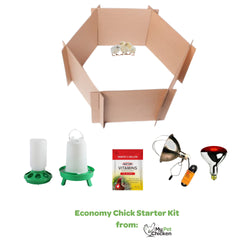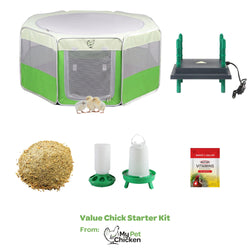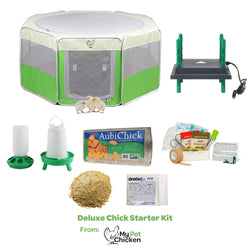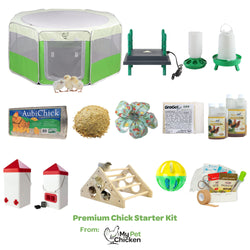Demystifying the Salmonella symptoms in chicken: A complete guide
Back to blogSalmonella infection in chickens is a concern for poultry owners and a potential source of contamination for humans. Understanding Salmonella symptoms in chickens is crucial for your flock's welfare and your family's safety. Some infected chickens may remain asymptomatic, making early detection challenging. In this comprehensive guide, we delve into the various symptoms associated with Salmonella infection in chickens, shedding light on what to watch for and when to seek veterinary assistance. Whether you're a seasoned poultry keeper or new to raising chickens, this article will provide valuable insights into recognizing and managing Salmonella symptoms in your feathered friends.
What are the Symptoms of Salmonella Poisoning?
Salmonella infection in chickens can manifest through a range of symptoms, though it's essential to remember that not all infected birds will display noticeable signs of illness. Here are the common Salmonella symptoms in chickens:
- Decreased Activity: Infected chickens often exhibit a noticeable decrease in activity levels, appearing lethargic or less active than usual.
- Drop in Egg Production: Egg-laying hens may experience reduced egg production or lay eggs with thin or misshapen shells.
- Diarrhea: Diarrhea is a prevalent symptom of Salmonella infection in chickens. Affected birds may pass watery feces, sometimes containing blood.
- Weight Loss: Infected chickens tend to lose weight, primarily due to a decreased appetite and compromised nutrient absorption.
- Ruffled Feathers: Chickens with Salmonella infection may display ruffled feathers, which can indicate their discomfort or illness.
- Respiratory Symptoms: Some infected chickens may show respiratory symptoms such as coughing or sneezing, though this is less common.
- Swollen Joints: Certain Salmonella strains, like Salmonella enteritidis, can lead to swollen joints in chickens. This condition is often referred to as "avian polyarthritis."
- Dehydration: Diarrhea resulting from Salmonella infection can lead to dehydration in affected chickens, exacerbating their overall condition.
- Death: In severe cases or when left untreated, Salmonella infection can result in death, especially in young or weak birds.
It's crucial to understand that not all chickens with Salmonella will exhibit these symptoms, and some may carry the bacteria without apparent signs of illness. Since Salmonella can spread rapidly within a flock and to humans through contact with contaminated feces, practicing excellent hygiene and implementing biosecurity measures when handling chickens and their eggs is essential.
If you suspect Salmonella infection in your flock or experience symptoms after handling chickens or their products, it's advisable to seek veterinary guidance. Additionally, consulting a healthcare professional is crucial if you or anyone in your household exhibits symptoms of illness after potential exposure. Proper cooking and adherence to food safety measures when handling and consuming poultry products are vital steps in reducing the risk of Salmonella infection.
notice when a chicken doesn't seem to be foraging as much as usual, because their birds are fed on conveyor belts. And they aren't really monitoring droppings, either.
How Long Does Salmonella take to Show Symptoms?
The incubation period for Salmonella infection in chickens can vary based on several factors. Generally, the incubation period for Salmonella in chickens is relatively short, typically ranging from 6 to 72 hours after exposure to the bacteria. However, it's essential to recognize that not all infected chickens will display symptoms during this period, and some may carry the bacteria without showing visible signs of illness.
- Age: Young chickens, especially chicks, may exhibit symptoms sooner after exposure to Salmonella, as they are more susceptible to infection.
- Stress: Stressors like overcrowding, inadequate nutrition, or environmental changes can weaken a chicken's immune system, potentially causing symptoms to appear more rapidly.
- Salmonella Strain: Different strains of Salmonella may have varying incubation periods and clinical presentations in chickens.
- Environmental Conditions: The cleanliness and hygiene of the chicken's living environment can impact the likelihood of infection and the onset of symptoms. Poor conditions can facilitate the spread of Salmonella.
- Bacterial Dose: The number of Salmonella bacteria ingested can influence the severity of infection and the timing of symptom development.
Maintaining robust biosecurity practices, which include regular cleaning and disinfection of chicken coops, providing proper nutrition, and monitoring for signs of illness, is essential for poultry owners. These practices can help mitigate the risk of Salmonella infection in your flock.
Suggestions for Reducing Salmonella Risk
To reduce the chance of contracting Salmonella from chickens or their products, consider the following recommendations from the Centers for Disease Control (CDC):
- Hand Hygiene: Always wash your hands thoroughly with soap and water immediately after handling live poultry or any items in the areas where they live and roam. Adults should supervise handwashing for young children and use hand sanitizer if soap and water are unavailable.
- Keep Poultry Outdoors: Avoid allowing live poultry inside your house, especially in areas where food or beverages are prepared, served, or stored.
- High-Risk Groups: Ensure that children under 5 years old, adults over 65, and individuals with weakened immune systems due to conditions like cancer treatment, HIV/AIDS, or organ transplants do not handle or touch chicks, ducklings, or other live poultry.
- Food Handling: Refrain from eating or drinking in areas where your chickens live or roam.
- Avoid Close Contact: Resist the urge to kiss your chickens or snuggle them, followed by touching your mouth or face.
- Outdoor Cleaning: When cleaning equipment or materials used for raising or caring for live poultry, do so outdoors. This includes cages, feeders, and water containers.
- Select Safe Sources: When acquiring new birds, consider buying them from hatcheries participating in the U.S. Department of Agriculture National Poultry
Improvement Plan (USDA-NPIP) U.S. voluntary Salmonella Monitoring Program. This program aims to reduce the incidence of Salmonella in baby poultry, enhancing both poultry and human health. (Yes, My Pet Chicken's hatchery is NPIP certified)!
It's worth noting that Salmonella bacteria can be found in various environments, including cat and dog feces, wild bird droppings, and even human feces. Therefore, maintaining good hygiene practices when handling your chickens and their living spaces is paramount.
Salmonella in Factory Farming
Massive outbreaks of Salmonella in chickens have been linked to factory farming practices. In such environments, birds often do not receive proper care, leading to significant health concerns. These large-scale outbreaks have resulted in extensive recalls involving millions of eggs and poultry products. In factory farms, identifying sick birds is challenging due to overcrowded conditions, making it difficult to notice deviations in individual bird behavior.
Workers in factory farms often do not monitor the appetite of individual birds, nor do they typically recognize when a chicken isn't foraging as usual. Birds are often fed on conveyor belts, and monitoring their droppings can be impractical in such settings.
Factory farms have been associated with situations where dead birds go unnoticed for extended periods, raising serious concerns about animal welfare and potential health risks.
In conclusion, it's essential to acknowledge that pet chickens, like any animal, can fall ill despite meticulous care. However, commercial entities do not always provide the same level of care for chickens as dedicated backyard flock owners. Small backyard flock keepers often know the name of every bird in their care and take extraordinary measures to ensure their well-being.
If you observe symptoms in your chickens that cause concern, we strongly recommend contacting a veterinarian to obtain a precise diagnosis. Salmonella symptoms in chickens may sometimes overlap with those of other illnesses, such as Colibacillosis or Newcastle disease. Regardless of the specific diagnosis, if your birds exhibit these symptoms, they require veterinary attention to address their health concerns.



